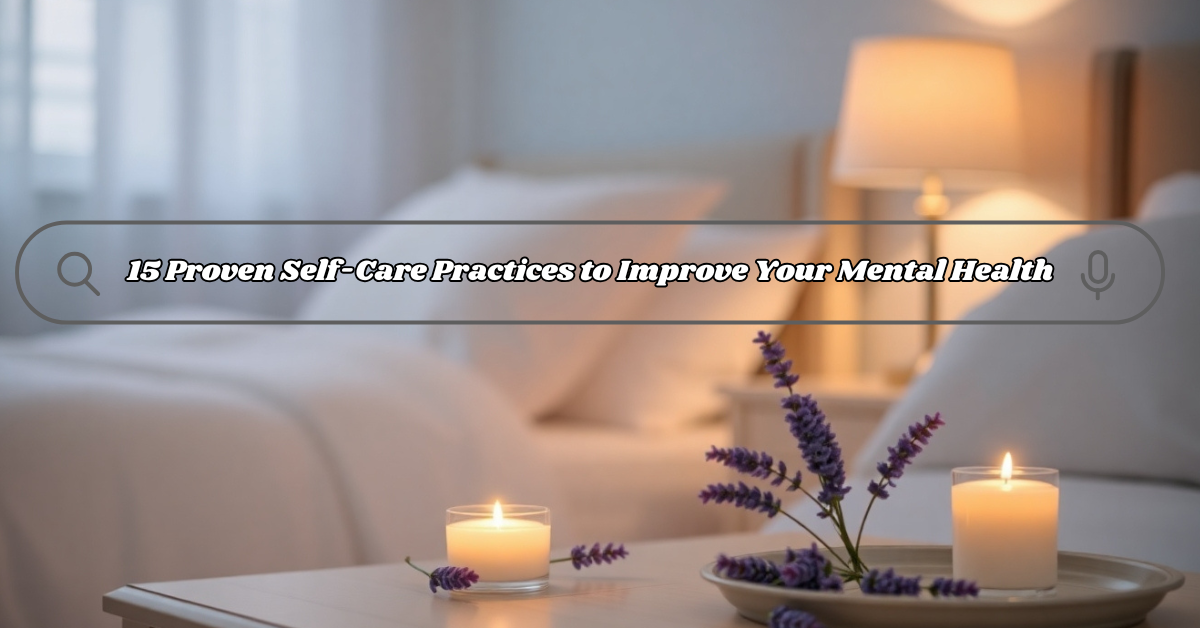Taking care of oneself Practices for Psychological wellness: A Far reaching Manual for Supporting Your Mind
In the present quick moving world, psychological wellness is more basic than any time in recent memory. Stress, tension, and melancholy are trendy expressions as well as genuine difficulties looked by millions. While proficient assistance is priceless, taking care of oneself practices assume a critical part in keeping up with mental prosperity. This blog dives profound into significant taking care of oneself procedures that can change your psychological wellness.
Grasping the Significance of Self-Care
Emotional wellness is much of the time eclipsed by actual wellbeing. Nonetheless, similarly as the body requires sustenance, so would the care. Taking care of oneself isn’t egotistical; it’s fundamental. Participating in standard taking care of oneself practices works on close to home flexibility as well as upgrades by and large efficiency and connections. An even brain encourages a satisfying life.

1. Focus on Rest for Mental Restoration
Rest is the foundation of emotional well-being. Lacking rest has been connected to expanded feelings of anxiety, unfortunate fixation, and state of mind problems. Laying out a reliable rest timetable can:
Further develop memory maintenance.
Diminish nervousness.
Upgrade close to home solidness.
To advance better rest, consider making a quieting sleep time schedule. Exercises like perusing, pondering, or utilizing lavender rejuvenating ointment can flag your mind that now is the right time to slow down.
2. Sustain Your Body, Feed Your Mind
The connection among diet and emotional well-being is unquestionable. Consuming a decent eating routine wealthy in supplements has been displayed to ease side effects of uneasiness and misery. Consolidate food sources like:
Verdant greens for cerebrum supporting folate.
Greasy fish for omega-3 unsaturated fats that lessen irritation.
Nuts and seeds for magnesium and zinc, which further develop mind-set guideline.
Stay away from extreme caffeine and sugar as they can cause energy crashes, deteriorating sensations of weariness and crabbiness.
3. Take part in Ordinary Actual Activity
Practice isn’t only for actual wellness; it’s a demonstrated solution for mental prosperity. Endorphins delivered during exercise go about as regular temperament lifts. Exercises like running, yoga, or even energetic strolling can:
Decline feelings of anxiety.
Support confidence.
Further develop rest quality.
Begin little by devoting 15-20 minutes everyday to development. After some time, this propensity can altogether upgrade your psychological strength.
4. Practice Care and Meditation
Care includes being available at the time without judgment. Customary practice assists people with overseeing overpowering feelings and considerations. Reflection, a famous type of care, decreases pressure by advancing unwinding. To start:
Commit 10 minutes everyday to profound breathing activities.
Use applications like Headspace or Quiet for directed meetings.
Practice appreciation journaling to move center from stresses to positive encounters.
5. Limit Screen Time and Advanced Overload
Consistent availability can overpower the cerebrum, prompting nervousness and burnout. Defining limits with innovation is a fundamental taking care of oneself step. Attempt:
Planning “no-screen” hours everyday.
Utilizing blue-light channels to decrease eye strain.
Taking part in disconnected leisure activities like artistic creation, perusing, or planting.
These practices empower inventiveness and unwinding, giving a psychological break from the computerized tumult.

6. Construct Areas of strength for a System
Human association is essential to psychological well-being. Encircling yourself with strong loved ones encourages a feeling of having a place. To reinforce connections:
Plan ordinary catch-ups with friends and family.
Join local gatherings or clubs.
Look for treatment or care groups for shared encounters and understanding.
7. Practice Profound Self-Awareness
Understanding your feelings is critical for viable taking care of oneself. Journaling is a great instrument for pondering your sentiments and recognizing triggers. By recognizing your feelings, you can:
Foster better survival strategies.
Impart needs successfully.
Stay away from close to home concealment, which frequently prompts more noteworthy trouble.
8. Put down Stopping points to Safeguard Mental Space
Saying “no” is a demonstration of taking care of oneself. Overcommitting prompts pressure and hatred. Defining limits focuses on your requirements without culpability. To lay out limits:
Impart your cutoff points obviously and deferentially.
Allot time for individual side interests and unwinding.
Delegate errands where conceivable.
9. Develop a Development Mindset
Embracing a development outlook includes seeing difficulties as any open doors for self-awareness. This point of view encourages flexibility and diminishes self-question. To sustain a development outlook:
Celebrate little accomplishments.
Gain from misfortunes as opposed to harping on them.
Encircle yourself with energy and motivation.
10. Participate in Imaginative Outlets
Imagination is an integral asset for psychological wellness. Participating in exercises like composition, painting, or playing an instrument gives a profound delivery and animates the cerebrum. Innovative outlets:
Lessen feelings of anxiety.
Upgrade critical thinking abilities.
Advance self-articulation.

11. Volunteer and Give Back
Helping other people is a satisfying taking care of oneself practice. Thoughtful gestures discharge dopamine, further developing state of mind and making a feeling of direction. Volunteer open doors could include:
Helping at neighborhood covers.
Taking part in local area clean-ups.
Coaching somebody out of luck.
12. Look for Proficient Help When Needed
While taking care of oneself practices are enormously gainful, they can’t supplant proficient assistance while managing extreme psychological wellness issues. Advisors and advocates offer customized methodologies to actually explore difficulties. Never wonder whether or not to look for help while feeling overpowered.
13. Consolidate Unwinding Techniques
Unwinding procedures like moderate muscle unwinding and directed symbolism can ease strain. These practices are especially useful during high-stress periods. Explore different avenues regarding various strategies to find what turns out best for you.
14. Cultivate a Solid Work-Life Balance
Adjusting proficient and individual life is urgent for emotional wellness. Workaholic behavior can prompt burnout, while disregarding private time hampers connections. Ways to accomplish balance include:
Setting reasonable work hours.
Focusing on undertakings with a plan for the day.
Enjoying customary reprieves to re-energize.
15. Observe Little Wins
Recognizing accomplishments, regardless of how minor, supports certainty and inspiration. Compensating yourself for progress supports positive ways of behaving. Keep a “triumph diary” to follow achievements and snapshots of satisfaction.

Conclusion
Emotional wellness is an excursion, not an objective. Integrating these taking care of oneself practices into your everyday schedule can make significant changes by they way you feel and capability. Keep in mind, taking care of oneself isn’t about flawlessness however progress. By focusing on your psychological prosperity, you are putting resources into a better, more joyful variant of yourself.





